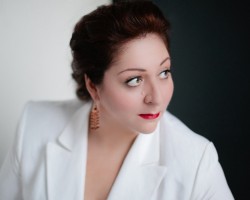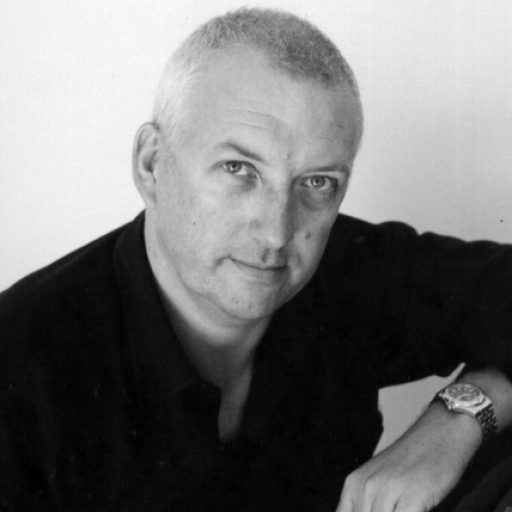It was by accident that the world now enjoys the sumptuous sound of dramatic soprano, Christine Goerke, as it was not in her grand scheme to be one of the world’s great operatic divas.
In fact, the American singer came from humble beginnings, and had chosen a path as a High School music teacher. It was her desire to follow these pursuits into a career of teaching High School band.
 And so it was, that Ms Goerke found herself auditioning at a state university in New York, only to discover when she undertook the sight-singing test, that the audition panel was more interested in her as a singer, than as a clarinetist.
And so it was, that Ms Goerke found herself auditioning at a state university in New York, only to discover when she undertook the sight-singing test, that the audition panel was more interested in her as a singer, than as a clarinetist.
“That was a gigantic blow to my ego,” Ms Goerke recalls.
“I actually had no plans to sing ever. I was a musician from the time I was a kid, starting on clarinet. I taught myself flute and saxophone, and I am a terrible oboe player, but it’s possible.
But I was desperate to play in Broadway pit orchestras. I loved old Hollywood musicals, so I had this great dream of going off to Hollywood and playing in one of those orchestras.”
She laughs at the thought of it now.
“So I thought, maybe it would just be easier if I just were to sing. That was the most stupid thought, but I went ahead, and I thought that maybe I would be a choral teacher instead. But I then found that I needed to have piano skills, so I taught myself piano (enough to get around).”
The real Ms Goerke is like an operatic alter-ego, hiding as a normal human being, devoid of the stardom and glamour that goes with much of the true operatic scenario. She is humble, very grounded, and always refreshingly self-deprecating.
But it was music that saved her, she thinks. Reflecting on the role that music education played in her life, and of how it almost became her life, Christine Goerke found music to be the salvation of her angry, sad childhood, after losing her mother at the tender age of twelve.
“I don’t know what I would have done, had I not had music,” she recounts.
“It took me a very long time to get my Bachelor’s degree (8 years in fact), as I was terrified to take out student loans. I realised that there was the possibility I was never going to have a job. I went to an inexpensive state university near my house in New York, not the prestigious Juilliard.”
Many students would have given up with the obstacles that occurred in her life.
“I would take a term off if I didn’t have the money. My professor knew of my situation and told me to just come in, and they would determine if they could test me and get me through.”
“I suppose you could say I had people looking out for me.”
Switching from a woodwind major to a singer was one enormous risk, but after four solid years of voice lessons, she felt she understood how her voice worked, and was ready to audition.
It was immediately apparent to the Artistic Director, Paul Kellogg, when she auditioned for the Young Artist programme at Glimmerglass Opera that here was a singer of whom to take notice. He called his counterparts at the New York Metropolitan Opera and insisted that they hear her.
So it was from her first bite at the big operatic apple that she ended up in the Metropolitan Opera’s Young Artist Programme for 3 years, afterwhich she took on roles with the Met, and also Glimmerglass Opera (Iphigenie en Tauride) in 1997.
By this stage she was singing principally Mozartian roles at the Met.
But it was performances at the Glimmerglass Opera Festival that provided the first occasion whereby others had really taken notice of her. It was also the first time that the opera cognoscenti started using the descriptor “Dramatic” in relation to her sound.
Going from a singing diet of Mozart and Gluck and then transitioning to the bigger repertoire of a dramatic soprano was not without its hurdles, although Goerke assures herself that having a bel canto technique was the key to her success.
“For me, it’s not about volume. There’s so much (in being a dramatic soprano) that is not about volume. There’s so much that allows you to sing really quietly, and with amazing line. As well, it allows for the clarity of the text. It’s only an interesting night when you make a lot of noise, when you don’t make a lot of noise, as well.”
Her teacher was an Italian teacher, and most people wondered why indeed Goerke chose her to study with, but her teacher was always about bel canto technique.
“That’s because it is the right way to sing,” asserts Goerke.
“When I first took on Elektra (I had sung Chrysothemis for a long time), I thought people are going to like this or not, but I’m not going to change.”
It would seem that her punt was a good one, and has paid off.
Since then, Goerke has performed lead roles with such companies as the Metropolitan Opera, San Francisco Opera, Lyric Opera of Chicago, Houston Grand Opera, Washington National Opera, Opera Company of Philadelphia, Santa Fe Opera, Seattle Opera, Pittsburgh Opera, Los Angeles Opera, Opera Theatre of Saint Louis, Opera Australia, Royal Opera House, Covent Garden, Théâtre du Châtelet, the Jacksonville Symphony Orchestra’s yearly opera, and Opéra National de Paris to name just a few.
“For me, you do have to have a certain instrument to sing this stuff. You can’t be a Pamina voice to sing Elektra. If you do have the right voice to sing this, you do have a responsibility to sing the music.”
When she sang the role of Elektra in Chicago in 2012, the Chicago Tribune wrote:
“Goerke sang her first Elektra last year in Madrid, after years of portraying Chrysothemis, the heroine’s fretful younger sister. She’s one of the few Elektras around who doesn’t sacrifice warm tonal beauty to the knife-edged, gallon-jug singing, demanded of every singer who runs this nearly two-hour vocal marathon.”
But just on ten years later, the celebrated soprano had her own vocal disaster looming. She woke one morning to discover that something had gone terribly wrong with her voice. She could not connect her breathing to the sound she was trying to produce.
“I am a wildly hard worker and everything I was doing just wasn’t working. For the life of me, I couldn’t work out what was happening. In the end it turned out to be such a simple thing. My voice had grown, and I had started to lift off from my support to try and keep my voice, enabling me to sing this lyric coloratura repertoire that I was doing. In fact, in reality, I was taking away my support and all the rest of my sound, which was coming to fruition a lot earlier that I had expected.”
Working through the fear, she sought help from another renowned teacher and found again how to connect the breath with the sound.
As if her life were not filled with enough liberal doses of drama, this singer chooses the roles which require all of her dramatic qualities to come to bear in her singing.
“It’s not always about the powerful female in this repertoire. It’s not always flying horses and women with breastplates on.”
“I’m just shy of 2 metres tall, so that works well for me. But Elektra is about a damaged, sad and broken woman – she is only powerful in her mind,” Goerke insists, as she reflects on her upcoming performance in Sydney.
“If all the volume comes at you all of the time, you cannot see the range of emotions. There is a remarkable palette of emotions in the role of Elektra,” she said.
It is not hard for Goerke to find the dramatic qualities necessary to sing such a role as Elektra.
“Once the first chord starts, I don’t really have to do anything but sing, and listen to the music. Strauss has given everything in the orchestration, in the line, in the silence, in the volume. It is all there. There are times in the score when I literally have to whisper. And he has orchestrated it in such a way, that I can do that. It is quite remarkable; it is also about pacing. I know when I need to keep myself in check, and when the big notes are coming.”
Goerke says with great ownership of the role, which is at the moment her signature role. It is as though Strauss had written it just for her.
The intelligence with which she speaks of her experiences and expectations in performing Elektra in Sydney, strikes a chord with the conductor, David Robertson who takes over the reigns of the Sydney Symphony Orchestra this month.
“I haven’t worked with Christine, but recently when I was conducting at the Met, she was, at the same time, preparing for her role in Strauss’ Die Frau ohne Schatten. And I have to say the excitement around that production was something incredible, and so much of it was due to the amazing musicality of Christine,” said Robertson.
“She is perhaps that greatest exponent of Elektra, and I couldn’t be more delighted in my first season in Sydney to be presenting this kind of artist to Sydney audiences.”
The conductor is quick to reassure that a performance of Elektra (even in the concert setting) is as relevant today as it was when it was first premiered.
“Much has been written about Elektra, because the story describes extreme emotional states that we see around us all the time. We don’t wear togas anymore (a reference to the Greek legend from which the story derives), but the themes that Elektra is dealing with are every bit as present in the human experience now, as they were several thousand years ago,” said Robertson.
Goerke agrees, and this thought is drawn from her very own environment of New York City.
“All of it (the story of Elektra) is relevant to a modern audience. Just turn on the news. There are murders every day. Every one is getting on with their lives, but there are always people not able to get past some things. And that’s partly how I see Elektra,” said Goerke.
Goerke insists that what is appealing in performing any role, particularly that of Elektra is that she is connected with the people on stage, and that there is a common intelligence to the task.
She will not be disappointed notwithstanding that this performance with the Sydney Symphony Orchestra and the Sydney Philharmonia Choir, will be a concert staging of the work.
“One of the things that is so wonderful about opera in concert is that it forces us to really concentrate on the music at the first level, and any other aspects become visual and atmospheric, in support of the music,” said Robertson.
Goerke concludes by saying how excited she is to be coming to Sydney to sing Elektra. Having sung it three times before (Madrid, Chicago and London – Covent Garden) and about to sing it at the London Proms, she is looking forward to returning to sing at the Sydney Opera House, this time with Lisa Gasteen (as Klytemnestra), Cheryl Barker (Chrysothemis), Peter Coleman-Wright (Orestes) and Kim Begley (Aegisthus).
[This article first appeared in the February 2014 edition of Fine Music: http://issuu.com/finemusic/docs/fine_music_magazine_february_2014 )
